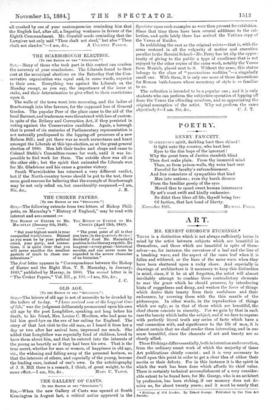OLD AGE.
[To TEE EDITOR OF THE " SPECTATOR." .1 Sia,—The leisure of old age is not of necessity to be dreaded by the toilers of to-day. "I have arrived now at the happiest time of life," was the judgment deliberately pronounced upon his own old age by the poet Longfellow, speaking, not long before his death, to his friend, Mrs. Louise C. Moulton, who had gone to bid him good-bye on the eve of her sailing for England. The story of that last visit to the old man, as I heard it from her a day or two after her arrival here, impressed me much. She added that Longfellow was especially fond of children, loved to have them about him, and that he entered into the interests of the young as heartily as if they had been his own. That is the true secret, whether for men or women, of happiness in old age, viz., the widening and falling away of the personal horizon, so that the interests of others, and especially of the young, become the leading ones, instead of one's own. In the autobiography -of J. S. Mill there is a remark, I think, of great weight, to the


































 Previous page
Previous page